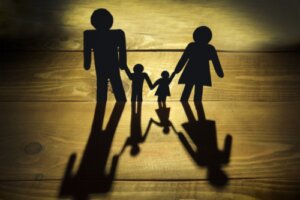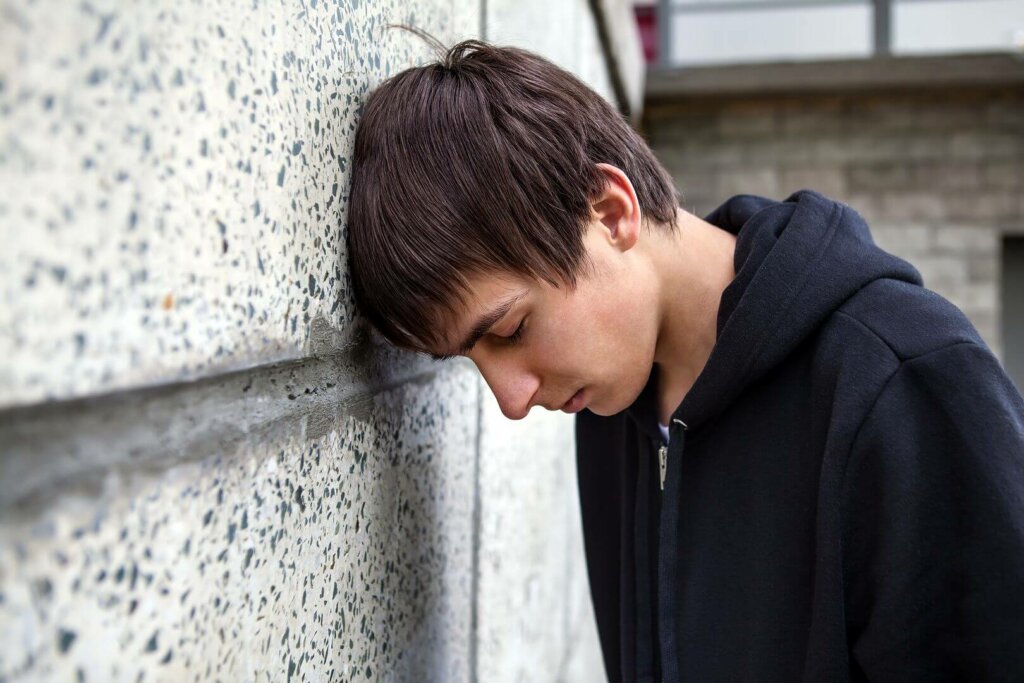Eight Signs That You Grew Up in a Dysfunctional Family


Written and verified by the psychologist Valeria Sabater
Did you grow up in a dysfunctional family? Obviously, none of us can choose our parents but we do know that what these figures do or don’t do leave permanent marks on us. For better or worse. In fact, our first experiences leave tremendously important imprints.
There are many who claim that their family life was disastrous and their home life was filled with yelling and arguments. However, these kinds of dynamics and experiences aren’t always necessarily the result of dysfunctionality. Indeed, sometimes, even within such a chaotic environment there’s love and feelings of well-being. In these cases, the yelling might come from parents who don’t love each other and eventually break up, but they don’t neglect their children.
All families are different. That said, in dysfunctional family environments, there are always conflicts, neglect, abuse, violence, and authoritarianism. Moreover, in many cases, there are mental disorders.
The suffering of the dysfunctional family is defined by unpredictability. Therefore, children or adolescents in these families never know what’s going to happen next. They feel anguish and a lack of control. This means they can’t adjust their own behaviors to avoid punishment or abuse and they’re plunged into perpetual states of permanent stress. Unsurprisingly, no one emerges entirely unscathed from an unhappy childhood.
The dysfunctional family is almost always governed by an authority figure. They don’t hesitate to project constant feelings of guilt onto others.

Eight Signs You Grew Up In A Dysfunctional Family
When it comes to dysfunctional families, we tend to believe they conform to a specific profile. We think of them as couples belonging to the lower social classes on the brink of separation. But, they don’t always conform to this idea. The one thing that does define them, though, is the projection of negative and harmful dynamics. Furthermore, both parents tend to complement each other in these abusive dynamics.
There are many nuances and peculiarities in these households. Research conducted by the Federal University of Kazan (Russia) indicates that dysfunctional families translate into childhood psychological trauma. Indeed, the impact of these experiences maintained over time is devastating for the development of the child.
The American Psychological Association (APA) defines a dysfunctional family as “a family in which relationships or communication are impaired and members are unable to attain closeness and self-expression”. These stressful and unpredictable dynamics marked by different forms of violence violate every basic need of us, as human beings.
If you grew up in a dysfunctional family, the following areas are likely to be familiar to you.
1. Physical violence and threats are the main means of control
In a dysfunctional family, threats are constant. They’re a coercive measure frequently used with the supposed intention of educating children. The language is always violent, lacking in affection, and governed by shouting. In many cases, it can even lead to physical violence, like shoving, hitting, pushing, etc.
2. Many forms of abuse
Abuse is understood as any behavior intended to harm someone more vulnerable or who, due to their situation, age, or circumstance, is at a disadvantage. Therefore, if you grew up in a dysfunctional family, you may have suffered the burden of authoritarian education, disqualification, mistreatment, sexual abuse, etc.
3. Family conflict
Dysfunctional families argue, fight, insult, and challenge each other. Consequently, the home is filled with shouting and continuous arguments, either between the parents themselves or with other figures. These kinds of violent dynamics leave their mark and are never forgotten.
4. Emotional invalidation
One thing that stays in your mind if you grew up in a dysfunctional family is the feeling of not being important. What you needed didn’t matter. Your feelings were unimportant. Therefore, you found it best to keep quiet and repress them. In effect, you swallowed and silenced your fears and sadness.
5. No communication
If you grew up in a dysfunctional family, as well as your needs, your words were unimportant. In fact, your parents preferred you to be quiet because they viewed silence as a sign of good education, submission, and obedience. For this reason, if you ever dared to give your opinion or contradict them, you were punished.
6. Unequal treatment and discrimination
Prejudice, gender bias, and all kinds of discrimination often occur in dysfunctional families. For instance, the eldest sibling might be appreciated more than the little ones, or the boys more than the girls. Or, it might be the father who dictates while the mother remains in the background.
7. Feelings of isolation
According to a study conducted by the University of Barcelona (Spain), in dysfunctional families, parents act almost like terrorists by isolating their children from their social environment.
This means the children and the parents hardly have any contact with their extended family (uncles, grandparents, cousins…). Moreover, they’re limited in their opportunities to make friends and enjoy friendships outside school.

8. Parents with addictions or mental disorders
If you grew up in a dysfunctional family, it’s highly likely that one of your parents suffered from some type of addiction or psychological disorder. For instance, alcoholism, drugs, gambling addiction, or borderline personality disorder.
These kinds of situations are exhausting for all the family members. In fact, these realities outline the chaos and unpredictability that we mentioned earlier. For instance, it’s never possible to foresee how these parents are going to react, and events are both uncertain and violent at the same time.
Finally, if you grew up in a dysfunctional family it’ll have undermined your worth, psychological tendencies, and emotional universe. Now you’re an adult, you must heal yourself. You need to rebuild yourself, leaving behind all those negative experiences. Then, you’ll be able to look to the future with hope.
Did you grow up in a dysfunctional family? Obviously, none of us can choose our parents but we do know that what these figures do or don’t do leave permanent marks on us. For better or worse. In fact, our first experiences leave tremendously important imprints.
There are many who claim that their family life was disastrous and their home life was filled with yelling and arguments. However, these kinds of dynamics and experiences aren’t always necessarily the result of dysfunctionality. Indeed, sometimes, even within such a chaotic environment there’s love and feelings of well-being. In these cases, the yelling might come from parents who don’t love each other and eventually break up, but they don’t neglect their children.
All families are different. That said, in dysfunctional family environments, there are always conflicts, neglect, abuse, violence, and authoritarianism. Moreover, in many cases, there are mental disorders.
The suffering of the dysfunctional family is defined by unpredictability. Therefore, children or adolescents in these families never know what’s going to happen next. They feel anguish and a lack of control. This means they can’t adjust their own behaviors to avoid punishment or abuse and they’re plunged into perpetual states of permanent stress. Unsurprisingly, no one emerges entirely unscathed from an unhappy childhood.
The dysfunctional family is almost always governed by an authority figure. They don’t hesitate to project constant feelings of guilt onto others.

Eight Signs You Grew Up In A Dysfunctional Family
When it comes to dysfunctional families, we tend to believe they conform to a specific profile. We think of them as couples belonging to the lower social classes on the brink of separation. But, they don’t always conform to this idea. The one thing that does define them, though, is the projection of negative and harmful dynamics. Furthermore, both parents tend to complement each other in these abusive dynamics.
There are many nuances and peculiarities in these households. Research conducted by the Federal University of Kazan (Russia) indicates that dysfunctional families translate into childhood psychological trauma. Indeed, the impact of these experiences maintained over time is devastating for the development of the child.
The American Psychological Association (APA) defines a dysfunctional family as “a family in which relationships or communication are impaired and members are unable to attain closeness and self-expression”. These stressful and unpredictable dynamics marked by different forms of violence violate every basic need of us, as human beings.
If you grew up in a dysfunctional family, the following areas are likely to be familiar to you.
1. Physical violence and threats are the main means of control
In a dysfunctional family, threats are constant. They’re a coercive measure frequently used with the supposed intention of educating children. The language is always violent, lacking in affection, and governed by shouting. In many cases, it can even lead to physical violence, like shoving, hitting, pushing, etc.
2. Many forms of abuse
Abuse is understood as any behavior intended to harm someone more vulnerable or who, due to their situation, age, or circumstance, is at a disadvantage. Therefore, if you grew up in a dysfunctional family, you may have suffered the burden of authoritarian education, disqualification, mistreatment, sexual abuse, etc.
3. Family conflict
Dysfunctional families argue, fight, insult, and challenge each other. Consequently, the home is filled with shouting and continuous arguments, either between the parents themselves or with other figures. These kinds of violent dynamics leave their mark and are never forgotten.
4. Emotional invalidation
One thing that stays in your mind if you grew up in a dysfunctional family is the feeling of not being important. What you needed didn’t matter. Your feelings were unimportant. Therefore, you found it best to keep quiet and repress them. In effect, you swallowed and silenced your fears and sadness.
5. No communication
If you grew up in a dysfunctional family, as well as your needs, your words were unimportant. In fact, your parents preferred you to be quiet because they viewed silence as a sign of good education, submission, and obedience. For this reason, if you ever dared to give your opinion or contradict them, you were punished.
6. Unequal treatment and discrimination
Prejudice, gender bias, and all kinds of discrimination often occur in dysfunctional families. For instance, the eldest sibling might be appreciated more than the little ones, or the boys more than the girls. Or, it might be the father who dictates while the mother remains in the background.
7. Feelings of isolation
According to a study conducted by the University of Barcelona (Spain), in dysfunctional families, parents act almost like terrorists by isolating their children from their social environment.
This means the children and the parents hardly have any contact with their extended family (uncles, grandparents, cousins…). Moreover, they’re limited in their opportunities to make friends and enjoy friendships outside school.

8. Parents with addictions or mental disorders
If you grew up in a dysfunctional family, it’s highly likely that one of your parents suffered from some type of addiction or psychological disorder. For instance, alcoholism, drugs, gambling addiction, or borderline personality disorder.
These kinds of situations are exhausting for all the family members. In fact, these realities outline the chaos and unpredictability that we mentioned earlier. For instance, it’s never possible to foresee how these parents are going to react, and events are both uncertain and violent at the same time.
Finally, if you grew up in a dysfunctional family it’ll have undermined your worth, psychological tendencies, and emotional universe. Now you’re an adult, you must heal yourself. You need to rebuild yourself, leaving behind all those negative experiences. Then, you’ll be able to look to the future with hope.
All cited sources were thoroughly reviewed by our team to ensure their quality, reliability, currency, and validity. The bibliography of this article was considered reliable and of academic or scientific accuracy.
- Herrera Santí, Patricia María. “La familia funcional y disfuncional, un indicador de salud.” Revista cubana de medicina general integral 13.6 (1997): 591-595.
- Minullina, A.. (2018). Psychological Trauma Of Children Of Dysfunctional Families. 65-74. 10.15405/epsbs.2018.09.8.
- O’Shea Brown, Gillian. (2021). Dysfunctional Family Systems. 10.1007/978-3-030-61416-4_4.
This text is provided for informational purposes only and does not replace consultation with a professional. If in doubt, consult your specialist.







